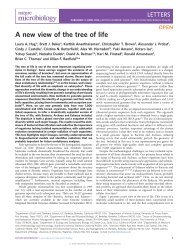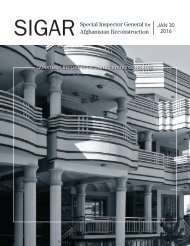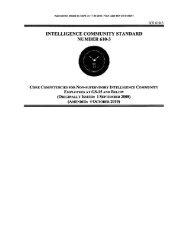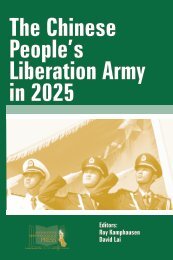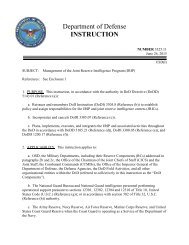The Joint Force in a Contested and Disordered World
JCS-JOE-2035
JCS-JOE-2035
Create successful ePaper yourself
Turn your PDF publications into a flip-book with our unique Google optimized e-Paper software.
This <strong>in</strong> turn led to the creation of local Somali militias to protect their fisheries. <strong>The</strong>se groups then<br />
transformed to conduct piracy aga<strong>in</strong>st <strong>in</strong>ternational shipp<strong>in</strong>g off the Horn of Africa. Eventually,<br />
these disruptions encouraged even more consequential <strong>and</strong> far reach<strong>in</strong>g effects, <strong>in</strong>clud<strong>in</strong>g<br />
accelerat<strong>in</strong>g the re-emergence of global Ch<strong>in</strong>ese naval power.<br />
Military Competitive Space<br />
“More <strong>and</strong> more of what goes on <strong>in</strong> other countries matters for the health <strong>and</strong> safety of the<br />
United States <strong>and</strong> the rest of the world. Many of the new dangers—such as health<br />
p<strong>and</strong>emics <strong>and</strong> transnational terrorist violence—stem from the weakness of states rather<br />
than their strength.” 39<br />
A wide range of <strong>in</strong>surgents, transnational extremists, <strong>and</strong> other states are likely to exploit failures<br />
by central governments. This environment will <strong>in</strong>clude a shift<strong>in</strong>g array of alliances, partnerships,<br />
<strong>and</strong> relationships featur<strong>in</strong>g, among others, transnational terrorist organizations, global cyber<br />
activist networks, private military firms, mercenary groups, <strong>and</strong> super-empowered <strong>in</strong>dividuals.<br />
New forms of “shadow” governance will likely emerge where organizations the United States<br />
deems illegal or illegitimate beg<strong>in</strong> to fulfill citizens’ needs, <strong>and</strong> problematically, are seen as<br />
legitimate by the local population.<br />
Urban centers may become sources of power for <strong>in</strong>surgent groups by l<strong>in</strong>k<strong>in</strong>g them to the wider<br />
global black market economy, as they seek to seize control <strong>and</strong> provide quasi-governance.<br />
Ungoverned urban zones are likely to permit the development of new or exp<strong>and</strong>ed black markets,<br />
<strong>in</strong>clud<strong>in</strong>g illicit flows of goods, drugs, weapons, currency, <strong>and</strong> human traffick<strong>in</strong>g. As dist<strong>in</strong>ctions<br />
between terrorist f<strong>in</strong>ancial operations <strong>and</strong> crim<strong>in</strong>al activities cont<strong>in</strong>ue to blur, the transactional<br />
connections between unlawful organizations are likely to confuse the dist<strong>in</strong>ction between law<br />
enforcement <strong>and</strong> military action. Additionally, the potential exists for better-resourced terrorist<br />
groups to operate more freely across geographic boundaries <strong>and</strong> exploit jurisdictional gray areas.<br />
Competitor states will exploit weak sovereignty <strong>in</strong> neighbor<strong>in</strong>g states to assert the preem<strong>in</strong>ence of<br />
their own national <strong>in</strong>terests <strong>and</strong> potentially <strong>in</strong>corporate shattered regions <strong>in</strong>to their own spheres of<br />
<strong>in</strong>fluence. <strong>The</strong>se assertive states will attempt to reconnect fragile <strong>and</strong> fail<strong>in</strong>g states to their<br />
economic <strong>and</strong> political systems <strong>and</strong> employ a variety of means to <strong>in</strong>terfere <strong>in</strong> the <strong>in</strong>ternal affairs<br />
of those states. <strong>The</strong>y will do so by exploit<strong>in</strong>g the <strong>in</strong>formation environment, creat<strong>in</strong>g pretexts for<br />
action through propag<strong>and</strong>a, political subversion, <strong>and</strong> the targeted coercion of leadership.<br />
In some cases, open <strong>in</strong>tervention, <strong>in</strong>clud<strong>in</strong>g the outright <strong>in</strong>vasion of a sovereign neighbor nation<br />
might occur <strong>and</strong> lead to large-scale, state-on-state conflict. However, there is a greater likelihood<br />
that stronger states will exp<strong>and</strong> their use of covert <strong>and</strong> irregular tactics aga<strong>in</strong>st weaker neighbors<br />
<strong>in</strong> an effort to <strong>in</strong>ternally fracture them. For example, recently fractured states around the Russian<br />
periphery present a number of levers that Russia may use to exp<strong>and</strong> its <strong>in</strong>fluence <strong>and</strong> reorient<br />
economic <strong>and</strong> political <strong>in</strong>terests. Strong external powers may also seek to fracture weak states as<br />
a way to underm<strong>in</strong>e U.S. regional <strong>in</strong>terests or distract the United States from other more important<br />
or consequential priorities.<br />
39<br />
John Ikenberry, “A <strong>World</strong> of Our Mak<strong>in</strong>g,” Democracy, (Summer 2011).<br />
38





